|
|
|
Sort Order |
|
|
|
Items / Page
|
|
|
|
|
|
|
| Srl | Item |
| 1 |
ID:
145521
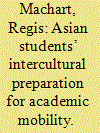

|
|
|
|
|
| Summary/Abstract |
Many academic contributions on Asian students abroad focus on their lack of interactions with the local population and their unpreparedness for intercultural encounters. Asian students appear as socially deficient and unfit for the new environment. These assumptions are problematic because they do not take into consideration the input prospective students receive prior to their departure through institutional training and unsupervised research on the host country under the student’s own initiative or a mix of both. Representations are also based on cultural differentialism which locates individuals in distinct, boundary-making categories, thus silencing most forms of individual diversities in the home and host societies. The main question arising thus deals with the kind of input that Asian future mobile students acquire, which is susceptible to impact their intercultural experiences. Data used for this article come from three different sets of interviews with Asian mobile students. Using a critical discourse approach, the discourses of these students are analysed from the perspective of their preparation to move to the host destination. Recurrent othering processes—both from institutional actors and from the students themselves—appear prior to departure, independent of the students’ origin and destination. Rather than blaming students, it would be more significant to look at what materials are available for them prior to their departure.
|
|
|
|
|
|
|
|
|
|
|
|
|
|
|
|
| 2 |
ID:
166089


|
|
|
|
|
| Summary/Abstract |
This article discusses the epistemological issues raised by the internationalisation of the social sciences as they affect the case of students from the People’s Republic of China who are trained in social sciences in France and return to pursue their career in higher education and research in China. The aim is to assess whether the epistemological differences between the two academic worlds may give rise to any professional difficulties in this many-sided scientific socialisation. Although our qualitative enquiry has revealed a number of differences, the problem of the availability of professional opportunities does not seem to have a distinctively epistemological dimension.
|
|
|
|
|
|
|
|
|
|
|
|
|
|
|
|
| 3 |
ID:
117721
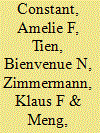

|
|
|
|
|
| Publication |
2013.
|
| Summary/Abstract |
In this paper we provide an overview of China's human capital strategy and educational achievements over the last two decades. While everyone acknowledges China as an economic superpower, very few are aware of or realize China's notable achievements in education as well as its internationalization of education. Since 1978, the landmark for the foundation of the Chinese modern higher education system, China has made tremendous strides in education both domestically and internationally. While China maintains 10% growth in GDP, albeit with a GDP per capita at a low level for a developing country, it is also producing serious scholars and a tremendous amount of scholarly output; more and more Chinese students are seeking higher education abroad; and international students are showing a rising interest in receiving education in China.
|
|
|
|
|
|
|
|
|
|
|
|
|
|
|
|
| 4 |
ID:
089608
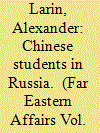

|
|
|
|
|
| Publication |
2009.
|
| Summary/Abstract |
The interest of Chinese young people in studies in Russia is conditioned by the requirement for qualified personnel due to the development of bilateral economic cooperation, and it is also prompted by a comparatively low cost of education. Despite the perceptible atmosphere of xenophobia, Chinese students assess their stay in Russia positively, in the main, and express the desire to work in our country after completing their studies, or, at least, to maintain regular business connections with it. Although most of them do not master Russian well enough, they do not stay jobless. China shows readiness to use the services of Russian institutions of higher learning on a broader scale, but, apparently, they are not prepared for that
|
|
|
|
|
|
|
|
|
|
|
|
|
|
|
|
| 5 |
ID:
122991
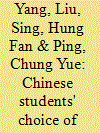

|
|
|
|
|
| Publication |
2013.
|
| Summary/Abstract |
Based on human capital theory, this article views the choice of major as an investment in human capital, and uses quantitative methods to analyse the choice of major of Mainland Chinese students when studying higher education abroad, and their affecting factors. The data used in this study, which sampled 12,961 Mainland Chinese senior secondary school students, are from a data set from a project subsidised by the Research Grant Committee of Hong Kong. Economic factors, such as expected economic return and expected employment prospects have significant effects on Chinese students' choice of major, after controlling factors relating to individual characteristics and family background. Furthermore, this article, using the case of China, provides feedback for the human capital theory and also proposes policy implications for developing and developed countries, and for international education institutions.
|
|
|
|
|
|
|
|
|
|
|
|
|
|
|
|
| 6 |
ID:
158180
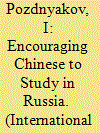

|
|
|
|
|
| Summary/Abstract |
For instance, foreign students who study in Australia and number between 480,000 and 520,000, about 30% of them Chinese, are the source of considerable state revenues for Australia, which grow by between 12% and 15% a year.1 New Zealand has become another leader in the world education market.2 Various studies have attempted to find out why Australia and New Zealand are such successful exporters of education. Those studies analyzed those countries' education advertising policies, adjustment principles for education programs and ways of simplifying visa formalities as measures that have stimulated young people all over the world, primarily in China and India, to seek paid education in Australia or New Zealand. The fact that both these countries are English-speaking and their education systems are associated with British classical education is their chief marketing advantage in Asia.
|
|
|
|
|
|
|
|
|
|
|
|
|
|
|
|
| 7 |
ID:
169495


|
|
|
|
|
| Summary/Abstract |
The period from the 1950s to the 1960s witnessed a significant change in the relationship between China and the Soviet Union, which evolved from that of a friendly partnership to one of antagonistic rivalry. This change also plunged Chinese students in different Soviet universities and research institutes into a more complex situation. As Sino–Soviet relations soured over time, these young students had to follow instructions from their homeland and adjust their roles and standpoints accordingly. While they were supposed to stand for the friendship between the two countries and as representatives of the driving force dedicated to socialist construction, they were, however, torn between their own studies and the political priorities of the state. In most cases, they had no choice but to give up hitherto relatively unconstrained lives and fight against revisionism, like frontline soldiers, based on their belief in the Chinese Communist Party (CCP) and their motherland. This in turn immediately put them under direct pressure and made them targets of tit-for-tat policies from Soviet authorities. As they were committed to prioritizing their political work rather than their own studies, they became integrated into the Chinese state as major players and witnessed the worsening trend in Sino–Soviet relations that eventually resulted in a complete breakdown.
|
|
|
|
|
|
|
|
|
|
|
|
|
|
|
|
| 8 |
ID:
165963
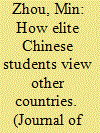

|
|
|
|
|
| Summary/Abstract |
This study examines Chinese university students' feelings towards foreign countries, using original high-quality survey data collected in 2014 at three top universities in Beijing. First, elite Chinese students' perceptions of specific countries are revealed. Being from top universities, these individuals will have great influence on China's future politics and international relations. It is thus important to gauge their perceptions of other countries. They generally feel warmly towards the European Union, Russia, and the United States, but harbour cold feelings towards Northeast Asian neighbours (Japan and the two Koreas). Second, this study finds that the effects of the socio-demographic and political factors underlying students' feelings differ greatly from country to country. I construct various social profiles of the students (dis)liking particular countries. Third, this study establishes a connection between nationalism and feelings towards particular countries. Chinese nationalism is not equally targeted at all other countries. While it elevates animosity mainly against Japan and the US, it promotes a closer rapport with North Korea and Russia.
|
|
|
|
|
|
|
|
|
|
|
|
|
|
|
|
| 9 |
ID:
083676
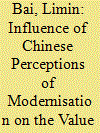

|
|
|
|
|
| Publication |
2008.
|
| Summary/Abstract |
Based on findings from a survey of Chinese students in New Zealand, this paper examines Chinese students' perception of "modernisation", and links their evaluation of New Zealand education to issues in contemporary Chinese education and society. By examining the motivating factors for selecting New Zealand as their educational destination, the effects of these factors on their experience in New Zealand, and their comparisons between New Zealand and Chinese education, this study finds that Chinese students' experience in New Zealand closely relates to Chinese views of modernisation and the value of education generally, which are influenced by China's drive for economic growth and the rise of materialism. The problems that Chinese students face abroad reflect the dilemmas and challenges in current Chinese society and education
|
|
|
|
|
|
|
|
|
|
|
|
|
|
|
|
| 10 |
ID:
189904
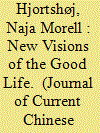

|
|
|
|
|
| Summary/Abstract |
In recent years, efforts to promote entrepreneurship as a possible career path for Chinese university students have intensified alongside the implementation of the official campaign of “mass entrepreneurship and mass innovation” (大众创业, 万众创新, dazhong chuangye, wanzhong chuangxin). Based on semi-structured interviews and long-term ethnographic fieldwork conducted at two Chinese elite universities, this article examines what motivates young Chinese to become entrepreneurs. It is argued that Chinese students imagine entrepreneurship as an alternative to ceaseless striving for high-paying jobs. They believe that becoming entrepreneurs will enable them to pursue their own interests, engage in meaningful projects, experience a life of excitement and variation, and become masters of their own time. This notion of the good life ties in with broader discourses of well-being that are currently proliferating among youth in urban China.
|
|
|
|
|
|
|
|
|
|
|
|
|
|
|
|
| 11 |
ID:
128154
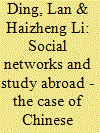

|
|
|
|
|
| Publication |
2012.
|
| Summary/Abstract |
Using a unique data set on Chinese visiting students in the US, we investigate some non-traditional determinants, especially social networks/connections, on the number of Chinese students hosted in American universities. Applying truncated, OLS, and GLS estimation, we find that social networks/connections have a strong positive and significant effect, and the result is robust across model specifications and estimation methods.
|
|
|
|
|
|
|
|
|
|
|
|
|
|
|
|
| 12 |
ID:
141517
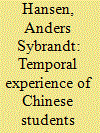

|
|
|
|
|
| Summary/Abstract |
This article examines the experiences of Chinese elite university students abroad through the lens of temporality. In the struggle to get ahead, elite students are expected to carefully deploy their time. Studying abroad, it is argued, has become one more step in a culturally idealised temporal arrangement of how one is expected to go about advancing. The downside to this ethics of striving is shown to be a pervasive sense of restlessness (浮躁, fuzao). The article shows how relocating to a different life environment allowed a group of elite students to respond to their temporal predicament in existentially creative ways that registered socially as personal maturation. It is argued that these responses were set in motion by the students’ inhabiting an expanse of not-yet-purposeful time. Treating the temporal experience of Chinese elite students as a pronounced inflection of an increasingly global temporal mode of striving, the article enquires into the temporality of the present human condition.
|
|
|
|
|
|
|
|
|
|
|
|
|
|
|
|
|
|
|
|
|